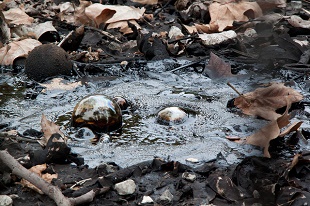 FLICKR, BETSY WEBERTiny droplets of water found in oil samples from a tar pit harbor active microbial life, according to a study published today (August 8) in Science. The microbes actively metabolize oil from the oily lake, and offer hints that other seemingly inhospitable environments might be home to such life forms.
FLICKR, BETSY WEBERTiny droplets of water found in oil samples from a tar pit harbor active microbial life, according to a study published today (August 8) in Science. The microbes actively metabolize oil from the oily lake, and offer hints that other seemingly inhospitable environments might be home to such life forms.
Rainer Meckenstock of Helmholtz Zentrum München’s Institute of Groundwater Ecology in Germany and his colleagues collected undisturbed samples of oil from Pitch Lake, the world’s largest natural asphalt lake, in La Brea, Trinidad and Tobago. Under a microscope, the researchers discovered motile, metabolically active microbes in drops of water no more than one microliter to three microliters in size. The observation was “contrary to a previous hypothesis that the low water activity would impose water stress, making such environments too extreme for microbial life,” Meckenstock and his colleagues wrote in their paper.
Sequencing the microbiomes in these droplets revealed methanogenic communities that included bacterial species from the orders Burkholderiales, Enterobacteriales, and others typically found in oil samples, including solid samples from Pitch Lake, and a ...





















